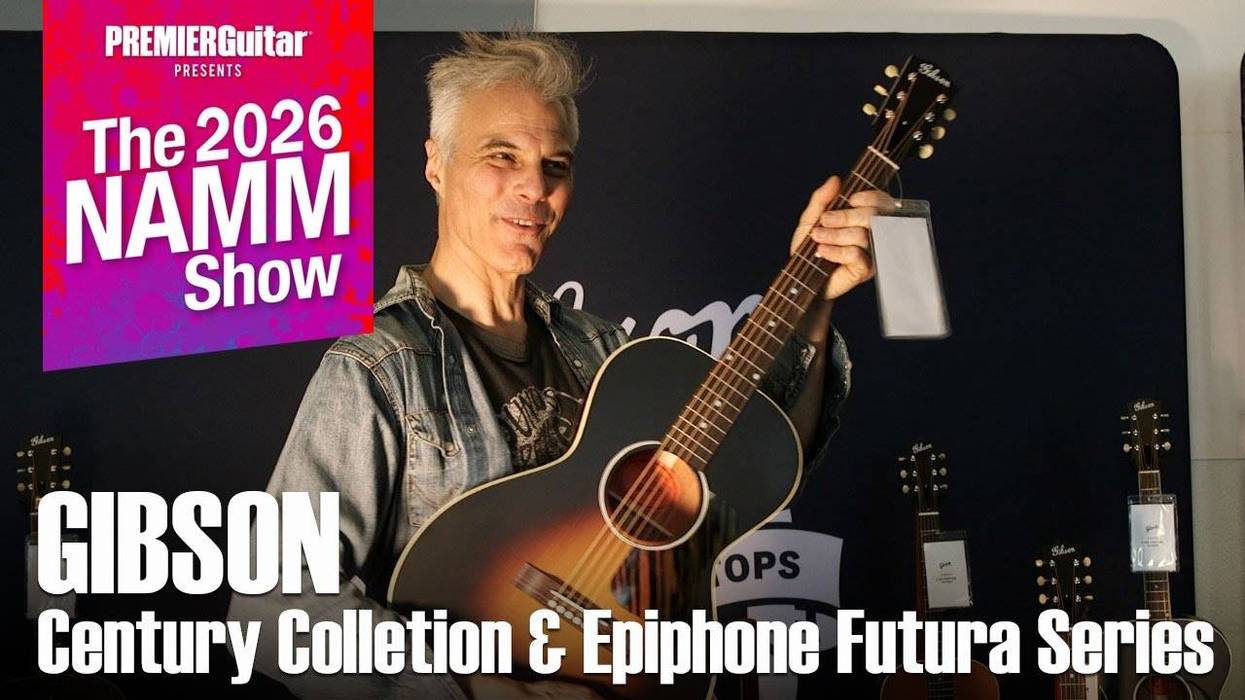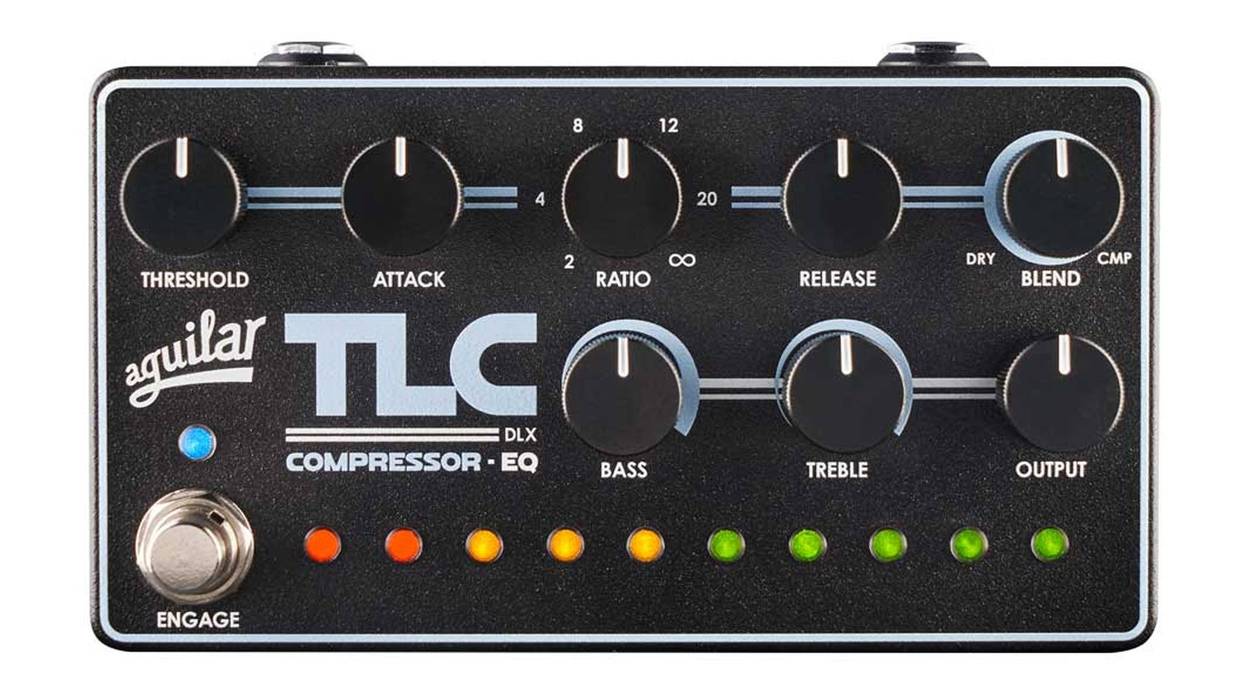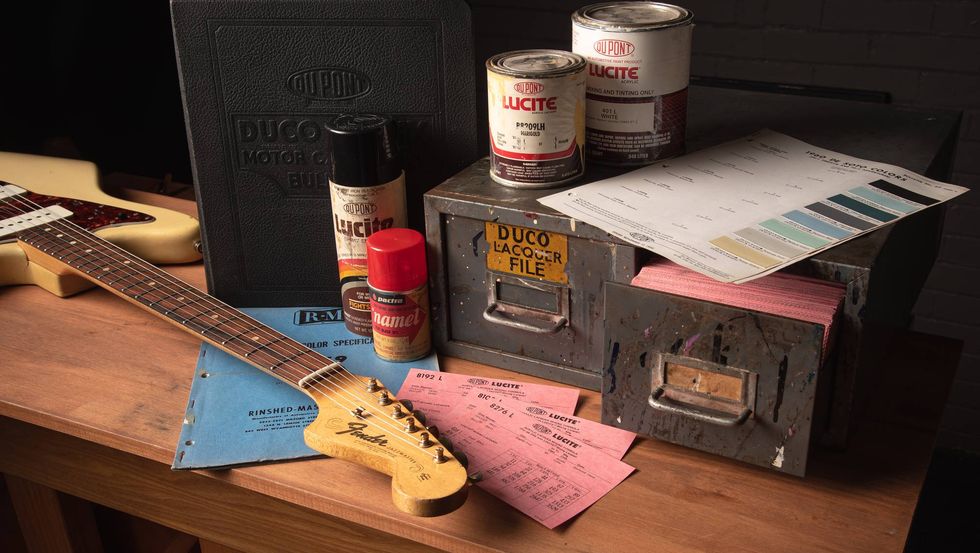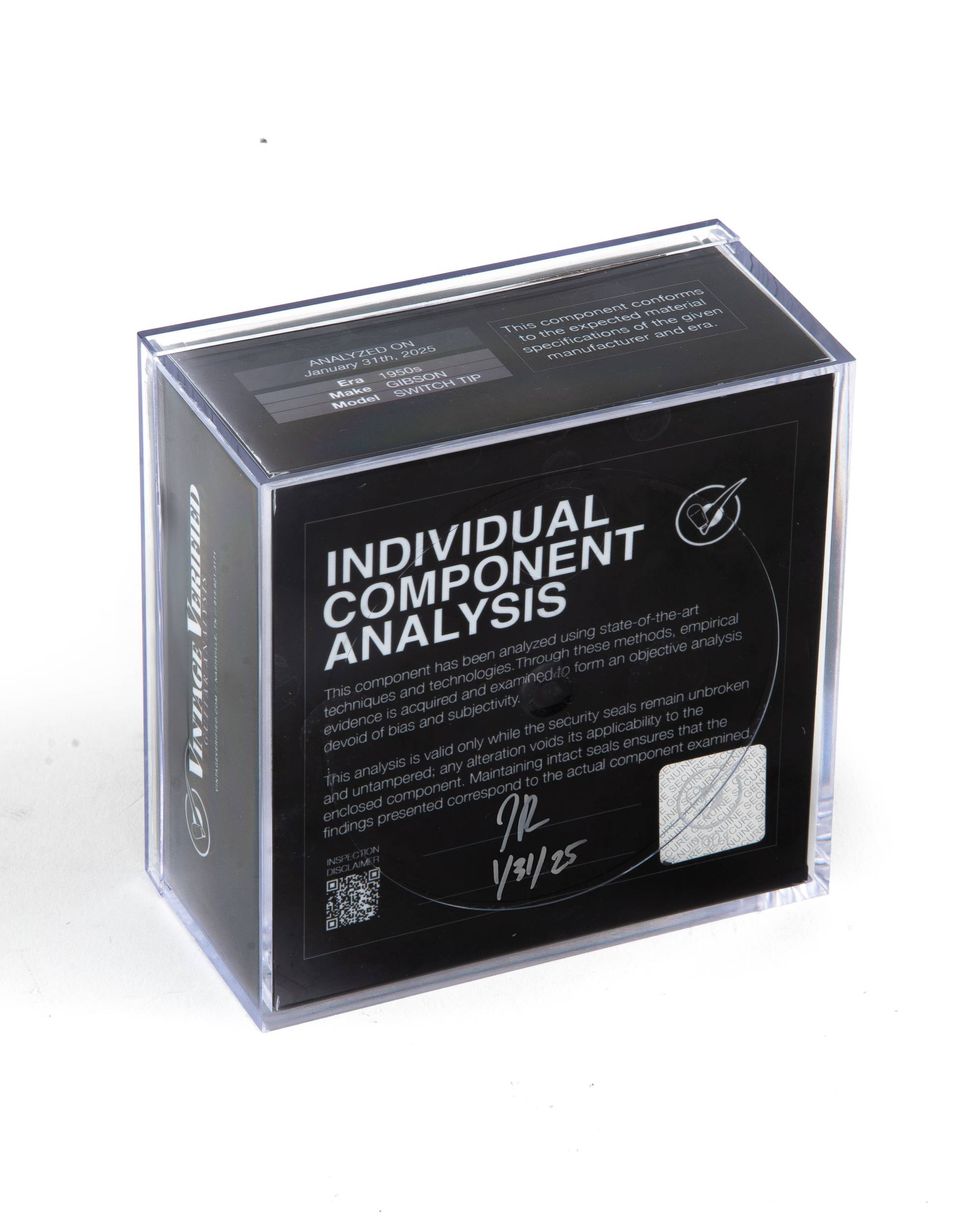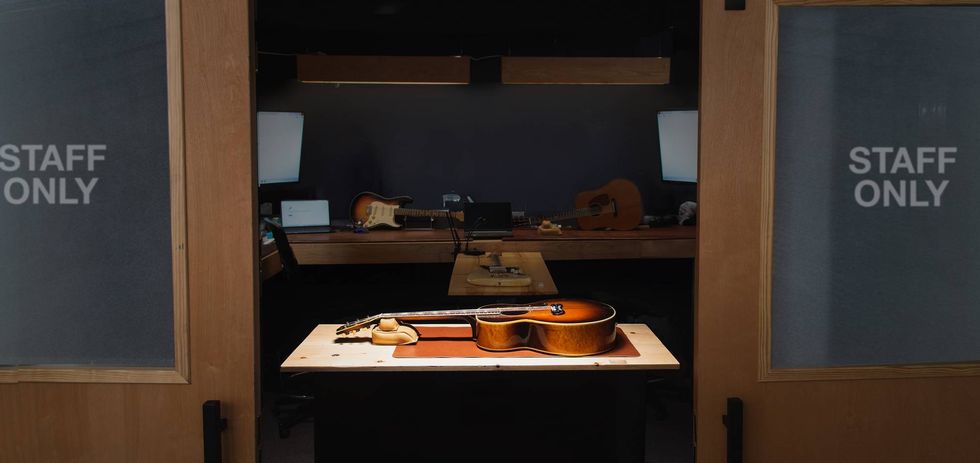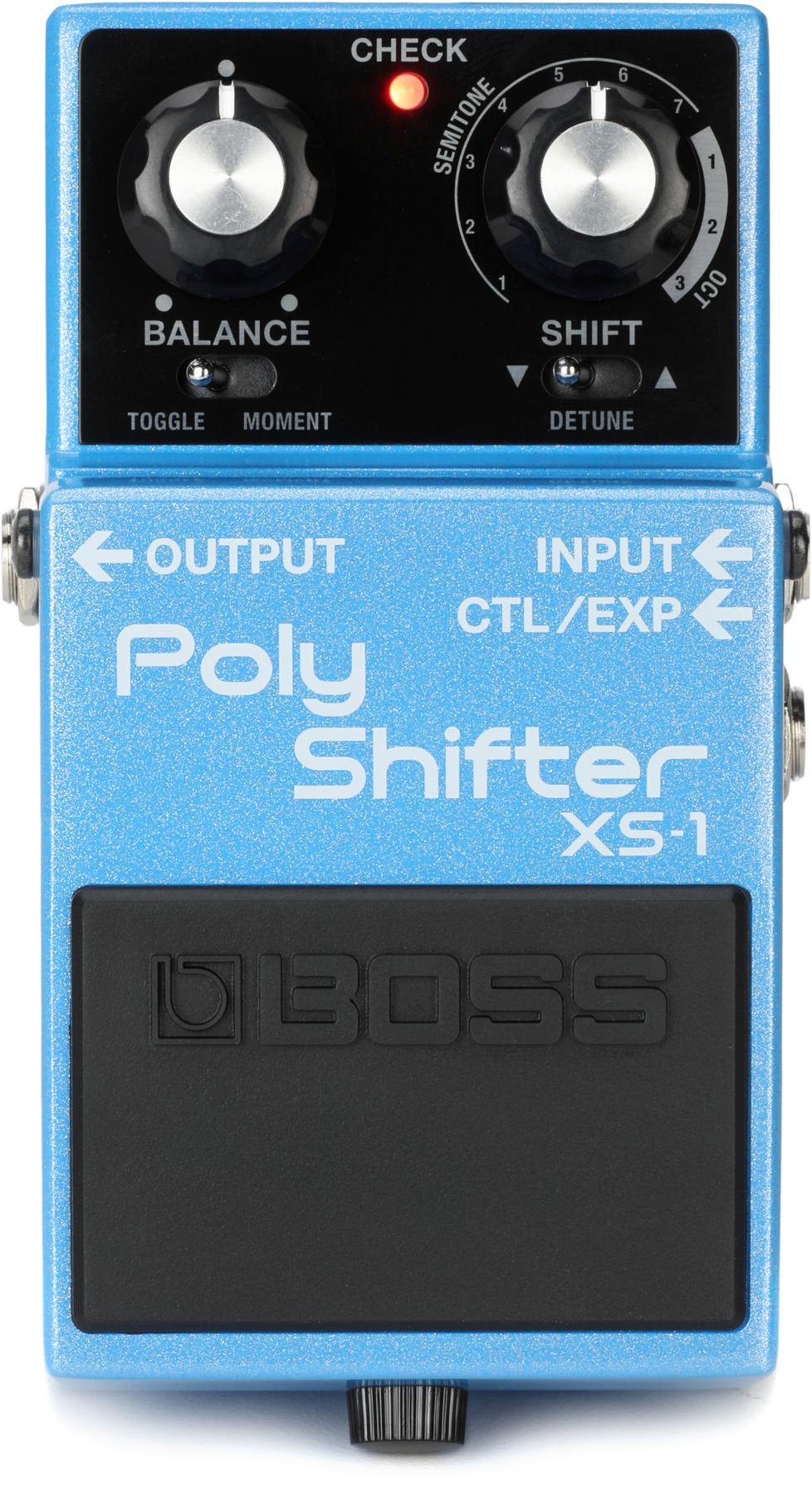| Download Example 1 EGBD | |
| Download Example 2 DGDG | |
| Clips recorded through a 1973 Fender Champ. | |
As a member of Grinderman, Cave’s most straight-ahead and hard-rocking project in years, Ellis has thrashed at both Fender Musicmasters and Fender electric mandolins. Doubtless, it was a love of these two instruments—plus a dose of Ellis’ irreverent, free, and Frankenstein-ian musical sensibilities—that led him to develop his signature Eastwood. The result is a most uncommon electric 4-string tenor electric that not only suits Eastwood’s reputation for embracing oddball instruments and Ellis’ unorthodox approach to guitar, but also opens sonic frontiers typically ignored by 6-string acolytes.
It ain’t no banjo!
The tenor guitar has a muddled history at best. Its rise in popularity in the first third of the 20th century is probably attributable to the popularity of the similarly strung and tuned tenor banjo, which had enormous appeal in early jazz circles because of its cutting timbre. While the 6-string guitar ultimately eclipsed banjo and tenor guitar in popularity, major builders kept the tenor guitar alive. Gibson and Martin were both big tenor builders. And when the guitar went electric, Guild, Gretsch, Gibson, and Rickenbacker made electric tenor or tenorinspired instruments. Today, Ellis—along with a few other high-profile tenor freaks like Neko Case—is helping to keep the instrument alive and in the public eye.
The 23"-scale Warren Ellis Signature Tenor is a cool-looking little guitar. It’s flawlessly built, too. The alder body is cut into a shapely Musicmaster-/Mustang-/Duo- Sonic-style profile, only in more compact dimensions. The pickguard and chrome control-cavity cover are almost identical to those on a Mustang. And the body, neck, and headstock are all painted in a glossy vintage crème color—which looks fantastic with the faux-tortoiseshell pickguard. The chrome bridge is a hybrid of Telecaster and Mustang design philosophies, with four barrel-style saddles that are adjustable for height and intonation. Kluson-style tuners look very cool and well proportioned on the compact headstock, which is adorned with Ellis’ signature and karate-kick logo. And the rosewood fretboard is capped with narrow-profile vintage fretwire.
Burly Little Beast
I tested the Ellis tenor through a Fender Champ and a Vox Pathfinder, and it yielded a world of surprises right off the bat. First, the guitar was shipped tuned to proper tenor tuning—a set of fifths, C-G-D-A. The string spacing is also much wider than what you feel under hand on a 6-string, and the neck is slightly wider than your average tenor—a design that Ellis felt would better suit modern bass players and guitarists.
But string spacing accounts for only part of the odd feel. Unlike the fourth string on a 6-string—which is typically around .025 mm—the lowest string on a tenor is a .042, and on a short scale tends that tends to have a very elastic feel and perceptible sonic heaviness. The rest of the strings are on the heavier side too—with a .013 on top, and .017 and .030 on the second and third string, respectively.
Toying around with the few banjo chords in my vocabulary and using the C-G-D-A tuning, I immediately tapped into the unique merits of a tenor guitar. The string spacing makes fingerpicking this thing a delight. And adapting clawhammer banjo techniques to electric guitar tones resulted in some very interesting approaches to both composition and cool-sounding versions of old folk and country standards. Needless to say, it’s a real kick to lend a new feel to an old log like Hank Williams’ “Lost Highway” by playing it banjo style through an electric- guitar pickup and Vox amp.
Tuning the Ellis to D-G-B-E—the same as the highest four strings of a guitar in concert tuning—gave the guitar a unique and interesting sonic signature that would sound very cool as an overdub or accompaniment to a 6-string. The heavier D string lent a basic, first-position D chord an unmistakable girth and an extended frequency range. It’s not as easy to move from chord to chord, given the wide string spacing—and you’re not going to use this axe to do any lightning-quick pentatonic runs—but with a little practice I was able to flatpick arpeggios at a pretty aggressive tempo and could keep up with a buddy’s flattop accompaniment.
I got my favorite sounds from the Eastwood when I toyed with alternate tunings. Ellis has been known to tinker with amplified bouzouki, so I thought I’d try some Middle Eastern-tinged tunings with drones, doubles, and fifths, which really brought the little Eastwood to life, particularly with a little delay in the signal. The surprisingly hot single-coil positively bloomed with the muscular drone of the thick fourth string and the overtones from the sympathetically tuned first and third strings. It’s a potentially massive sound. And it’s easy to see why Ellis, who often embraces a sort of anti-technique involving clanging chords and single-note lead lines, would embrace this little guitar’s articulation and impressive resonance in the low midrange.
The Verdict
Not every player will find a use for the Eastwood Warren Ellis Tenor. But that doesn’t mean it doesn’t have a million potential sounds for imaginative and adventurous players to work with. It’s easy to imagine this guitar becoming an X factor in the studio because of its ability to lend such harmonic richness to say, an ordinary C chord. It’s also well designed to take advantage of the intrinsic advantages of tenor guitar, with a pickup that brilliantly highlights the huge harmonic and overtone potential of the heavier fourth and third strings, and the biting first and second strings. Despite its no-frills appearance, this is a guitar of remarkable versatility—one that can lend thrilling new flavors to roots music, Americana, and internationally flavored jams, as well as worlds of texture to the music of boundary-obliterating experimentalists (like its namesake). The tenor guitar may be an old concept, but this particular take on the form, and the collaboration between Eastwood and Warren Ellis, are truly inspired.
Buy if...
you’re fearlessly intrigued by new techniques and styles, or want to create unusual textures in the studio.
Skip if...
unknowns freak you out or you prefer sticking to standard 6-string tones and techniques.
Rating...
Street $499 - Eastwood Guitars - eastwoodguitars.com |













